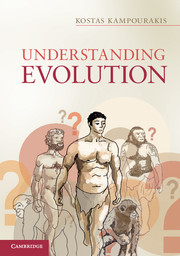Book contents
Concluding remarks
Published online by Cambridge University Press: 05 June 2014
Summary
In the previous chapters I first explained why, religious resistance aside, particular teleological and essentialist intuitions make evolution seem counter-intuitive. Then I explained what conceptual change in evolution consists of and I described Darwin’s conceptual change as an exemplar case. After that, I presented some of the central concepts of evolutionary theory in the light of the conceptual obstacles already discussed. I hope it is clear that evolutionary theory is a powerful theory which answers many questions about the living world around us and which still has many questions to answer in the future. This is the nature of all scientific theories and this is what makes science exciting and interesting. In this concluding chapter I am explicit and specific about why evolutionary theory is a good scientific theory. Finally, I describe which questions I think this scientific theory cannot answer and what implications it has.
The virtues of evolutionary theory
What constitutes a good scientific theory? This is a difficult question to answer, but Ernan McMullin (2008) has provided a useful list of the virtues of a good scientific theory: (1) empirical fit (support by data); (2) internal consistency (no contradictions); (3) internal coherence (no additional assumptions); (4) simplicity (testability and applicability); (5) external consistency (consonance with other theories); (6) optimality (comparative success over other theories); (7) fertility (novel predictions, anomalies, change); (8) consilience (unification); and (9) durability (survival over tests). A final virtue is explanatory power, which is actually a consequence of all the other virtues. Evolutionary theory is the theory that explains the origin of species on Earth in general and of their particular characters in particular. More generally, evolutionary theory explains the unity and the diversity of life on Earth. It comprises several propositions, principles, and models – as any other valid scientific theory. However, evolutionary theory is an interestingly special case because it has often been described as “only a theory.” This reflects a misunderstanding of science and a misuse of the colloquial meaning of the word theory, often synonymous with speculation or hypothesis (e.g., “I have a theory about this”). The statement that evolutionary theory is “only a theory” is nevertheless appropriate if it means to suggest that it is a scientific theory the same as many others (relativity theory, atomic theory, plate tectonics) and not a secular religion or anything else beyond the realm of science.
- Type
- Chapter
- Information
- Understanding Evolution , pp. 208 - 217Publisher: Cambridge University PressPrint publication year: 2014



